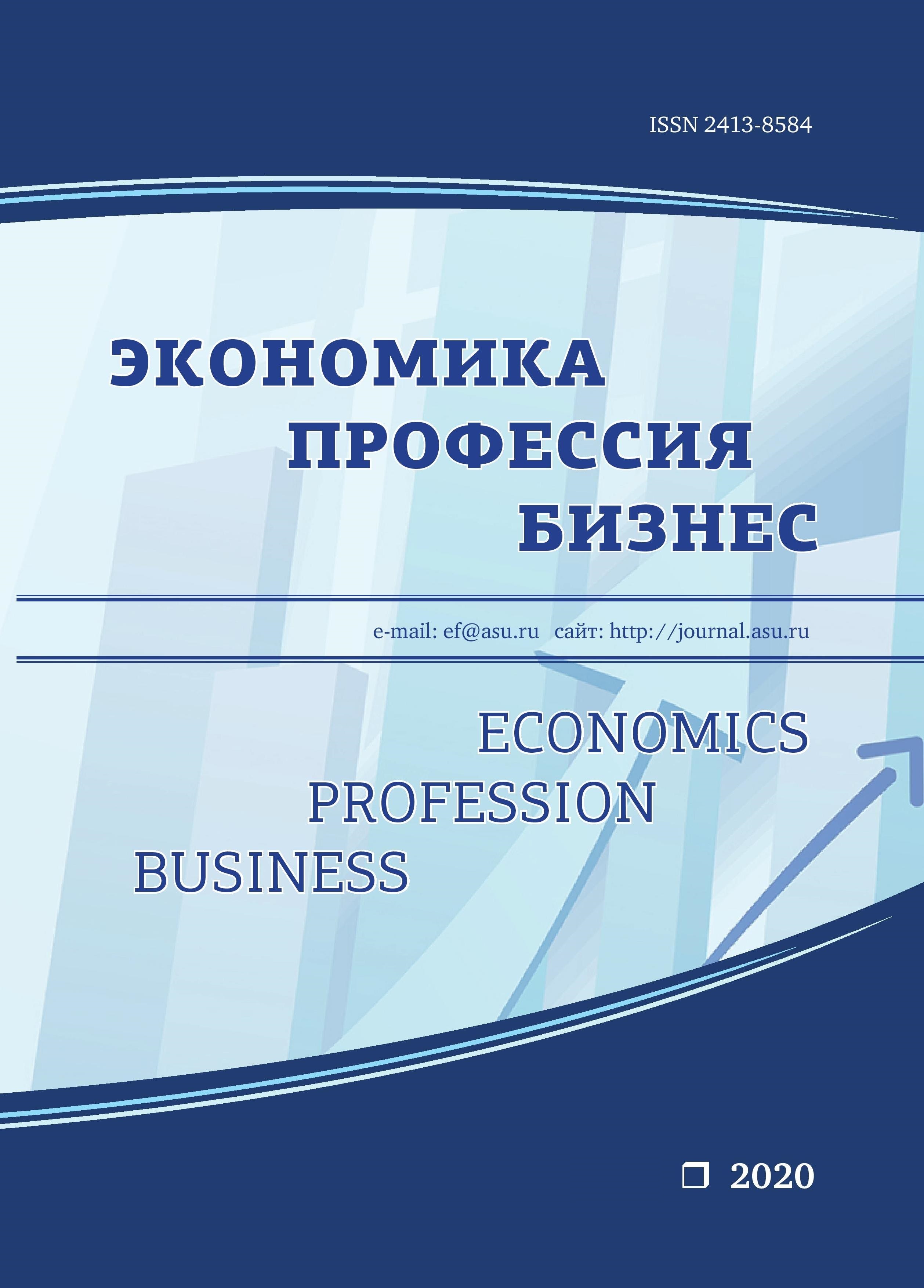ON THE ISSUE OF QUANTITATIVE ASSESSMENT OF THE EFFECTIVENESS OF REGIONAL ORGANIZATIONS OF SECONDARY ACADEMICAL EDUCATION
УДК 336:37 (571.150)
Abstract
The article is devoted to the problems of evaluating the effectiveness of regional state budgetary secondary vocational institutions in the Altai Territory. The author analyzing the methods used in practice for assessing the activities of professional educational organizations, determines the degree of development of existing assessment models, and considers modern interpretations of the concepts of “criterion” and “indicator”.
The current practice of monitoring the activities of professional educational organizations allows to compare the content and structural elements of all existing systems, the results of which revealed duplication of criteria and a methodological error in the form of substitution of effectiveness indicators with performance indicators. To eliminate the identified violation, as well as the justification of decisions on the development of the vocational secondary education, the the author proposes the ways, improving the assessment system when conducting regional and federal monitoring of this area of activity through the development and application, also effectiveness and performance criteria.
Downloads
Metrics
References
Гречин Н. А., Соколова Т. В., Поташникова К. Г. Методика определения рейтинга учреждений профессионального образования // Профессиональное образование. 2006. № 11. С. 22-24.
Сосницкий К. М. Оценка эффективности деятельности образовательных учреждений среднего профессионального образования // Научные исследования в образовании. 2011. № 1. С. 36-45.
Питухин Е. А. Методика оценки эффективности подготовки кадров системой профессионального образования в регионах Дальневосточного федерального округа // Непрерывное образование: XXI век. 2018. № 4 (24). [Электронный ресурс]. URL: https://lll21.petrsu.ru/journal/article.php?id=4325, свободный. Загл. с экрана (дата обращения: 09.01.2020).
Толковый словарь современного русского языка / Д. Н. Ушаков. М.: Аделант, 2013. 800 с.
Коротков Э. М. Исследование систем управления: учебник. М.: ДеКА, 2000. 130 с.
Словарь С. И. Ожегова [Электронный ресурс]. URL: http://slovarozhegova.ru/word.php?wordid=12386, свободный. Загл. с экрана (дата обращения: 09.12.2019).
Райзберг Б. А., Лозовский Л. Ш. Словарь современных экономических терминов. 4-е изд. М.: Айрис-пресс, 2008. 480 с.
Мониторинг, статистика, социология в деятельности образовательного учреждения: рабочая тетрадь. М.: НФПК, 2005. 219 с.
Электронное периодическое издание «Справочная правовая система КонсультантПлюс: версия Проф. Версия 4018.00.70. 1992-2019 // КонсультантПлюс. Сборка 425942.
Волкова С. С. Система оценки эффективности и результативности деятельности краевых государственных бюджетных профессиональных образовательных учреждений в Алтайском крае: теория и практика // Экономика Профессия Бизнес. 2019. № 3. С. 24-31.
Приказ Минобрнауки России от 17.06.2016 № 723 «О проведении в 2016 году мониторинга качества подготовки кадров в образовательных организациях, реализующих программы среднего профессионального образования». Дата обновления: 09.07.2019. Доступ из системы ГАРАНТ // ЭПС «Система ГАРАНТ»: ГАРАНТ-Максимум. Вся Россия / НПП «ГАРАНТ-СЕРВИС-УНИВЕРСИТЕТ». Версия 8.00.2.025.
Мониторинг СПО [Электронный ресурс]. URL: https://miccedu.ru/p/monitoring_spo, свободный. Загл. с экрана (дата обращения: 09.07.2019).
О результатах мониторинга качества подготовки кадров в 2018 году: информационный бюллетень. М.: МИРЭА — Российский технологический университет, 2018. 35 с.
REFERENCES
Grechin N. A., Sokolova T. V., Potashnikova K. G. (2006) Methodology for determining the rating of professional education institutions. Professional education, 11, 22-24 (in Russian).
Sosnitsky K. M. (2011) Evaluation of the effectiveness of educational institutions of secondary vocational education. Scientific research in education, 1, 36-45 (in Russian).
Pitukhin E. A. (2018) Methodology for evaluating the effectiveness of training by the system of professional education in the regions of the far Eastern Federal district. Continuous education: XXI century, 4 (24). URL: https://lll21.petrsu.ru/journal/article.php?id=4325, free (in Russian).
Explanatory dictionary of the modern Russian language, D. N. Ushakov. (2013) Moscow, 800 (in Russian).
Korotkov E. M. (2000) The study of management systems. Textbook. Moscow, 130 (in Russian).
Dictionary Of. S. I. Ozhegov (2019). URL: http://slovarozhegova.ru/word.php?wordid=12386, free (in Russian).
Reisberg B. A., Lozovsky L. Sh. (2008) Dictionary of modern economic terms. 4th ed. M., 480 (in Russian).
Monitoring, statistics, and sociology in the activities of an educational institution. Workbook (2005). M., 219 (in Russian).
Law assistance system «Consultant Plus»: Prof. Version 4018.00.70. 1992-2019 Consultant Plus. Build 425942.
Volkova S. S. (2019) Estimation system for efficiency and performance of the educational state budgetary professional educational institutions in the Altai krai: theory and practice. Economy. Profession. Business, 3, 24
(in Russian).
Order of the Ministry of Education and Science of Russia dated June 17, 2016 No. 723 “On the conduct in 2016 of monitoring the quality of training in educational organizations implementing secondary vocational education programs”. Access from the “Garant” Law assistance system. Version 8.00.2.025 (in Russian).
Monitoring of the secondary vocational education. URL: https://miccedu.ru/p/monitoring_spo, free (in Russian).
On the results of monitoring the quality of training in 2018. News bulletin (2018). Moscow: MIREA — Russian University of Technology, 35 (in Russian).
Economics Profession Business is a golden publisher, as we allow self-archiving, but most importantly we are fully transparent about your rights.
Authors may present and discuss their findings ahead of publication: at biological or scientific conferences, on preprint servers, in public databases, and in blogs, wikis, tweets, and other informal communication channels.
Economics Profession Business (EPB) allows authors to deposit manuscripts (currently under review or those for intended submission to EPB) in non-commercial, pre-print servers such as ArXiv.
Authors who publish with this journal agree to the following terms:
- Authors retain copyright and grant the journal right of first publication with the work simultaneously licensed under a Creative Commons Attribution License that allows others to share the work with an acknowledgement of the work's authorship and initial publication in this journal.
- Authors are able to enter into separate, additional contractual arrangements for the non-exclusive distribution of the journal's published version of the work (e.g., post it to an institutional repository or publish it in a book), with an acknowledgement of its initial publication in this journal.
- Authors are permitted and encouraged to post their work online (e.g., in institutional repositories or on their website) prior to and during the submission process, as it can lead to productive exchanges, as well as earlier and greater citation of published work (See The Effect of Open Access).









